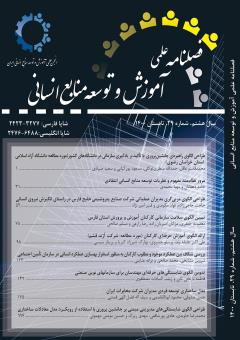تدوین الگوی شایستگیهای حرفهای مهندسان برای سازمانهای نوین صنعتی
محورهای موضوعی :فاطمه نارنجی ثانی 1 , زینب السادات مصطفوی 2
1 - گروه علوم تربيتي، دانشکده روانشناسی و علوم تربیتی، دانشگاه تهران، تهران، ایران
2 - دانشکده روانشناسی و علوم تربیتی، دانشگاه تهران، تهران، ایران
کلید واژه: مهندسانشایستگیهای عمومی شایستگیهای تخصصی سازمانهای صنعتی,
چکیده مقاله :
پژوهش حاضر با هدف تدوین الگوی شایستگیهای حرفهای مهندسان برای سازمانهای صنعتی نوین ، انجام شده است. روش پژوهش از نظر هدف کاربردی و از منظر گردآوری دادهها کمی ازنوع توصیفی- تحلیلی بوده است. جامعه آماری پژوهش شامل؛ 1)اعضای هیئتعلمی متخصص، دارای دکتری مهندسی و فعال در حوزه صنعت، 2)مدیران و کارشناسان خبره شاغل در سازمانهای صنعتی با تجربه 5 سال یا بیشتر و و دارای مدرک مهندسی که از 5 دانشگاه و 4 سازمان صنعتی برتر به تعداد 467 نفر که با استفاده از فرمول نمونهگیری کوکران، حجم نمونهای به تعداد 216 نفر به شیوهی نمونهگیری تصادفی طبقه ای انتخاب گردید. جهت شناسایی شایستگیهای حرفه ای مهندسان برای ورود به سازمانهای صنعتی، پیشینه پژوهشهای انجام شده و سایت onet مورد بررسی قرار گرفته، سپس شایستگیهای استخراج و بر مبنای آن به دو دسته کلی ؛ عمومی و تخصصی طبقه بندی شدند. به منظور گردآوری دادهها از پرسشنامه محقق ساخته 42 گویهای استفاده شد که ضریب آلفای کرونباخ برای همه شاخصها زیربنایی ابزار 3/82 به دست آمد. جهت بررسی روایی پرسشنامه نیز از نظر خبرگان مرتبط و هم چنین روایی سازه استفاده شد. نتایج پژوهش نشان داد: 1- شایستگیهای حرفهای مورد نیار شامل؛ شایستگی های عمومی (شایستگی شخصیتی، برنامهریزی، شناختی) و تخصصی (سیستماتیک، کاربردی، اخلاق حرفهای و استراتژیک) می باشد 2- مدل کلی پژوهش با استفاده از تحلیل عاملی تأییدی مورد برازش قرار گرفت. 3- همه نشانگرها به طور معنیداری با عامل زیربنایی خود مرتبطبودند و مدل اندازهگیری طی ارزیابی شاخصهای جزئی مطلوب بود.
The present study industrial modern organizations industrial organizations. The research method was applied in terms of purpose and a little descriptive-analytical in terms of data collection. The statistical population of the study includes; 1) Expert faculty members in engineering and active in the field of industry, 2) Managers and experts working in industrial organizations with experience of 5 years or more and have an engineering degree from 46 universities and 4 top industrial organizations to 467 people. Using Cochran's sampling formula, a sample size of 216 people was selected by stratified random sampling. In order to identify the professional competencies of engineers to enter industrial organizations, the background of the researches and the onet site have been examined, then the qualifications of extraction and based on it into two general categories; General and specialized were classified. In order to collect data, a 42-item researcher-made questionnaire was used and the Cronbach's alpha coefficient for all underlying indices was 82.3. To evaluate the validity of the questionnaire, the opinions of relevant experts as well as the validity of the structure were used. The results showed that: 1- The required professional competencies include; General competencies (personality competence, planning, cognitive competence) and specialized competencies (systematic, applied, professional ethics and strategic. 2- The general model of the research was fitted by using confirmatory factor analysis. 3. All indicators were significantly related to their underlying factor and the measurement model was desirable during the evaluation of minor indicators.
